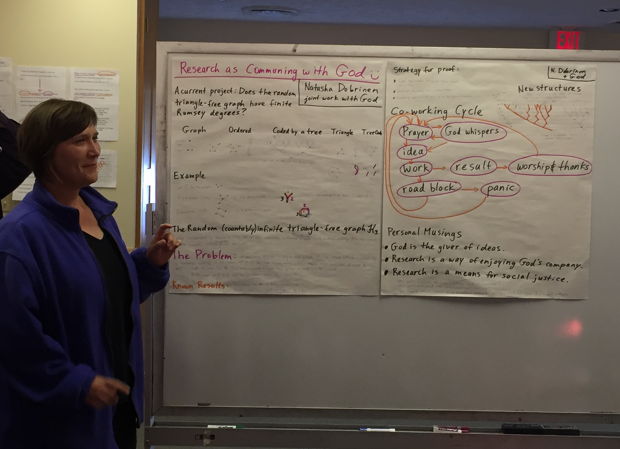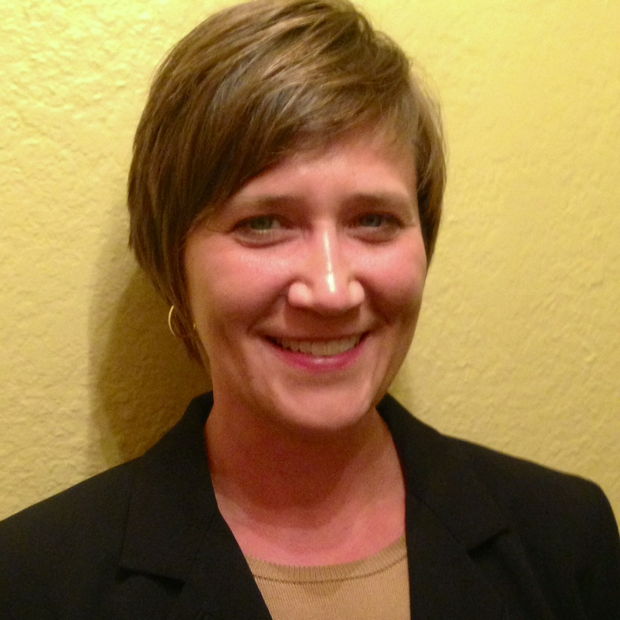Natasha, could you talk a bit about how you came to be a professor in mathematics? What was your path?
I was always good at math growing up, but no one ever said, "Oh — you should be a mathematician." I figured I would be a scientist or a doctor. High school geometry was probably the first time I discovered I loved doing hard math — it was really hard and it was really fun. In hindsight I can see how God was directing me into math even though I wasn’t yet a Christian.
At Berkeley, I declared math as a major so I could continue taking math courses. Later I had to decide whether I should continue on a pre-med track or plan on grad school in math. People who knew me said, "Wow, your eyes really light up when you talk about math — you look really excited. When you talk about medicine, I don't see that."
I said, "Okay, I'll take a long shot and apply for math grad schools and see how it goes." I struggled with the decision of where to attend. I visited Minnesota and afterwards had this impression that I knew was from God: "You have to go here." "But God, I got into other places that are better." "No, you need to go here. This will be a good place for you."
It was the right place for a lot of different reasons. One was the Graduate Christian Fellowship group there and another was my advisor who let me work on a topic that I just loved. Because I was his only student, he went to bat for me when I was on the job market.
So God opened doors, gave me little nudges here and there. That's how I ended up going to grad school in Minnesota.
After that, I just kept getting one job opportunity at a time. I got one post-doc and then another, and then I got the job offer at the University of Denver. I never really had to make that many decisions about where to go.
What's your biggest challenge in your work currently?
The biggest challenge is discouragement. I want to do everything well and struggle with having enough time. That’s discouraging. And I had hoped by this time there would be more women in math, but there just aren't — the system just isn't helpful. It gets discouraging to see the same problems and biases that I had hoped would be gone by now being perpetuated in the academic culture.
Discouragement also comes when you're working on a hard problem, and it's just not working out. Early in my career there was a lot riding on how much I published. Now that I have a permanent job it's not so much that sort of pressure. It's more the pressure of getting grants or getting invited to certain conferences.
Are there particular spiritual disciplines or exercises that you practice when you find yourself discouraged? What are your antidotes, if that's the right word, for discouragement?
I always remind myself that God called me to do this work and that he doesn't call me to something that's impossible. I also meet with some good friends for prayer. I usually send an email to a couple people and say, "Hey. Please pray for me. Feeling discouraged." And I just have quiet time to regroup with God.
What gives you the most pleasure in your current work?
I love having freedom and time to work on really hard problems — to go deep into my own brain in the presence of God and sit there and think. Sometimes I hear his voice and sometimes I don't, but either way he's still there.
Also, I'm looking forward to some trips coming up — it sounds hectic but, academically, it's going to be so much fun. I won't have meetings interfering — I can just work and think and work and think and work and think. I love getting lost in thought.
I would expect that when you are at a professional conference it's almost like being with your own tribe.
Right. You don't have to explain anything or justify it.
They understand you and they love what you do.
Exactly. Everybody thinks what you are doing is important. You don't have to make excuses for spending time on it.
That's great.
The other thing I enjoy about my work is seeing people succeed. I enjoy mentoring people, whether it's in the classroom or on research projects. I like encouraging other people and seeing them become stronger than they thought they could be.
Are there folks that did that for you?
In some ways. There have been people who have done that for me mathematically. Right now, not so much. But there are Christians in my life who encourage me in my calling to math even though they don't really understand what I'm doing.

This summer when we were at faculty camp, you presented a poster to help us understand how your faith has influenced the way you think about and do your work. Your poster includes a flow chart. Could you talk a little bit about your poster and how you live your life in Christ in the context of academia?
Over the years I've found that my work goes a lot better if I start with prayer. The beginning of all my good work or all of my peaceful work is prayer or listening to God, some type of interaction with him. Otherwise I get very anxious and worried about my ability to do the work.
There are a lot of times when you hit roadblocks or you've worked really hard, and it seems like it's all going down the tubes, and you're not going to get what you were trying for. So I cycle from my roadblocks and panic back to saying, "Okay, well God's with me. God loves me. God wants me to do well. Let's just go back to the beginning again and talk to God about this and maybe we'll do this and maybe we'll do something else." Going back to being centered on God and knowing my worth is from him rather than in whether I can solve this problem helps me move forward. More recently, I've discovered that when I end up solving a problem, rather than just feeling good about myself, I'm also really thankful God helped me with it. There are usually some key points where I needed help in a proof where God has supplied it or given me a thought or an idea or a vision. Getting a result with God's help leads to giving thanks to God and worshiping because this is really cool stuff that God already knew and I get to be a part of it!
When you talk about beginning your work with prayer or interacting with God when you hit a roadblock, are you just praying with your own words as they come to you? I'm curious if there are any resources that you use or psalms that you read? Or do you just find yourself responding to God and interacting with him in the moment?
I would say I do both. I don't do one thing all the time, but there have been times when I've written some Scripture down on a 3x5 card and put it on my desk to encourage myself. I'm sure no matter how far along I get, I'm always going to experience panic. I don't think I'm ever going to surpass that one. It is useful whenever that comes up just to talk with God through the panic and then go back to prayer.
Start over.
Precisely.
Your flowchart is really helpful, Natasha. It’s applicable for those working in any field — writers, engineers, academics. Grounding ourselves and our work in relation to God is key.
Are there things about your work that you would like Christians to understand?
The life of the mind is a real calling. If we can grow more in that understanding, we might help more people discern a calling to this — who might otherwise not have enough support to follow through. It honors God to be with him and think with him without the need for results or application. Well-meaning Christians ask, "Why don't you do something useful with your life? Why aren't you helping people? Spending eight or ten or twelve hours a day just thinking — Isn't that a waste of a life?”
We don’t have to answer the question, "What's it good for?" Just being with God and going through the process, doing this work is good.
I love how you articulate your sense of vocation and give people permission to be in fields where they invest in the life of the mind — that this endeavor in and of itself has beauty and value, even if it doesn't seem like there's some sort of practical application for it. Its beauty and value come from God. That's lovely. Thank you for saying that and for bringing the topic up, because we need to hear that.
I think probably for women, perhaps more than for men, there is a desire for permission for the “end” of their study to be the beauty of the subject matter. In our next conversation, I want to take up the topic of women in math — what your experience has been, and what advice you have for those considering pursuing a career in math or math-related fields.
Read the second part of this interview series that covers life as a smart girl, following God's call, and Natasha's unique take on solving problems.





